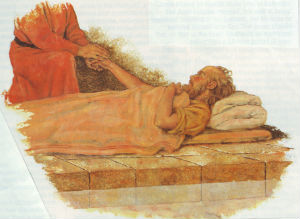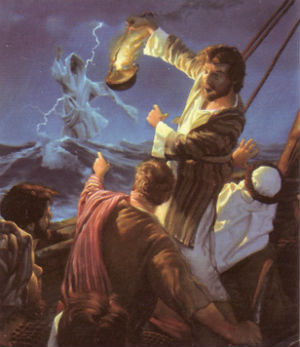 Jesus never turned down a healing request.
Jesus never turned down a healing request.By Neil Earle
The title of Mark Twain’s famous novel can help us refocus the Christmas story. Saint Paul out-scooped Twain by some 1800 years when he recorded this challenging “take” on the humble events surrounding our Lord:
“For you know the grace of our Lord Jesus Christ that though he was rich, yet for your sakes he became poor, so that you through his poverty might become rich” (2 Corinthians 8:9).

Jesus was descended from the legendary kings David and Solomon (Matthew 1:6, 16) yet he was placed in a manger. If we hadn’t heard the story so often we might say – “What a shocker!” Of course the Bible itself abounds in paradoxes, riddles, and tense near-contradictions. They are a Middle Eastern teaching method to get us to stop and think more deeply about what is being said. Think of a few scattered across Scripture: “Answer a fool/Don’t answer a fool” (Proverbs 26:4-5); day of death better than the day of birth (Ecclesiastes 7:1); the law is fulfilled/the law is on your hearts; we are after the flesh/we are in the Spirit (Romans 8:9).
Over the centuries Christian commentators have been inspired by the striking paradox in the whole Christmas story that the One who created all things chose to come to earth as a sucking child weaned by a Palestinian peasant girl. The Prince from eternity became the babe in the manger…and all of this was vitally necessary for our salvation for it shows us God came among us in great humility, that God is most often at work among the less, the least, the lost. Jesus suffered along with us from Day One--when he was about 2 years old his parents had to turn into refugees to escape the persecuting sword of the powers that were (Matthew 2:19-20).
 Jesus never turned down a healing request.
Jesus never turned down a healing request.What a welcome for the Son of God!
As a grown man he said once, “The foxes have holes but I have nowhere to lay my head” (Matthew 8:20).
Yet, though the Prince became a Pauper through the terms of his Incarnation he remained in every respect God (Colossians 2:9). This has to be the profoundest paradox of all – that by becoming like us, Jesus our Savior took our sinful nature upon himself and without sinning himself redeemed us one and all. If he were not God he could not have atoned for the race he created. Maybe one man could atone for one man, possibly, but when that man is God in the flesh – Immanuel – then we all have a chance to appeal for divine amnesty. By the terms of his life, death and resurrection Jesus lifted our common humanity into the heavenly places.
At baptism Christians are symbolically clothed with Jesus Christ (Galatians 3:27). Now, clothed with the one perfect man, Jesus, we get his safe passage to participate in the life of the Godhead, now and forever (Hebrews 2:10-19).
All of this was God’s intention from the beginning. God as a Trinity has eternally existed in perfect unity and harmony (John 1:1-3; Genesis 1:1-2). This three-way relationship – so close and so inseparable as to be described as one-in-three and three-in-one – this Trinitarian harmony is the fundamental basis of all effective workings in the universe (Colossians 3:3). Love truly does make the world go round. The wise man said that with the coming of a new baby into the world, we get to hope once again that the world can be all right. With the coming of the child of Bethlehem we get a glimpse into the true nature of God. God the Son, nestled in his straw bed that cold night in Palestine, was he who had co-existed with the Father and the Holy Spirit from all eternity. Jesus’ perfect submission to the will of his Father while still a human being, this sealed his appointed role as the Mediator between God and man. In so doing, Jesus modeled how peace will come to all the human family and thus became the Prince of Peace.
The New Testament explains this sometimes difficult theology in colorful word pictures. Jesus, the new Adam, reversed the first Adam’s fall (Colossians 1:15-20; Romans 5:18; 1 Corinthians 15:21-22). As the perfect Atoning Sacrifice, the precious lamb of God, He also became our eternal High Priest, effecting the reconciliation of all things and all humanity to His Father through the power of the eternal Spirit. That Spirit inspired his obedience (Hebrews 9:14).
 There were times when Jesus' divine nature was obvious.
There were times when Jesus' divine nature was obvious.Right now, Jesus is ministering in his priestly office between God and man (1 Timothy 2:5) for even as adopted children of God we still sin. Daily. But Jesus was the Sin Bearer. In a dramatic and almost breath-taking statement, St. Paul shows that Jesus, the man who was God, took the whole human race down into destruction with him in his death (2 Corinthians 5:14). He did this so that by His resurrection he could take us up with him into the heavenly places (Ephesians 2:6). Through this participation in the Trinity we are given new life (Romans 6:11). We are accepted in the beloved Son (Ephesians 1:6).
Thus ‘adoption” becomes a useful one-word summary of what God is effecting through Jesus as the head of this new restored humanity
And on the practical level the humble walk of Jesus was and is the only Way to the Father, the Revealer of Truth, and the Giver of new life. Seminary student Brad Jersak attended a “Christ at the Checkpoint” forum in Bethlehem sponsored by a Bible College there. After seeing hatred on all sides – Jew, Muslim, Christian – he was more convinced than ever that only “an explicit surrender to the rule and reign of the Prince of peace whose message is the roadmap to peace” will really work. What he called “the Jesus Way” of radical forgiveness rooted in a realistic humility over what we have all done to each other is the answer for the Middle East and all people (Plain Truth, Winter, 2012).
The humility starkly demonstrated by God’s paradoxical gift of a babe as an outcast, a refugee on the road to escape – these are the challenging counteractions of God. These realities shame and condemn the pride, hate and grandiosity that blocks peaceful attitudes in modern Bethlehem, the office board room or right on our block. There is one transcendent fact about the Way of Jesus, one factor that can unroll the burden of the hates and frustrations we carry around like spiritual weights on our back that block humility, confession and the embrace and extension of forgiveness. It is that Jesus’ ongoing work as Priest and Mediator shows us we are already in God’s good graces. God is not mad at us, he is waiting for us to accept his offer of divine amnesty.
“O come all ye faithful, joyful and triumphant;
O come ye, O come ye, to Bethlehem.”
This is what religious terms such as atonement, redemption and salvation come down to in the end. And it all began with the Incarnation – the babe of Bethlehem laid down amidst the hay to become the humble Spirit-filled Reconciler, the atoning sacrifice. That is something we can celebrate on December 25…and every day of the year.